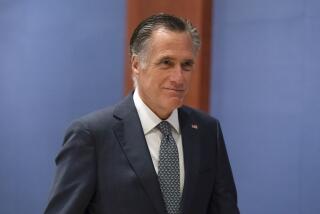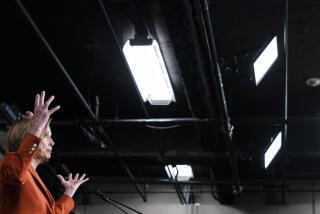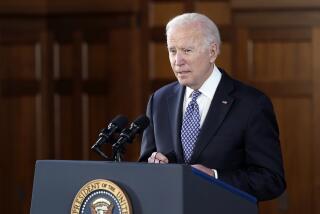Republicans and White House continue hammering out stimulus package to fight coronavirus

WASHINGTON — Senate Republicans and Democrats outlined competing ideas Thursday for what looks likely to be a $1-trillion stimulus package to limit the financial fallout from the coronavirus pandemic.
Conversations are currently underway behind closed doors, but it’s unclear how quickly an agreement will be reached, even as the economic damage spreads.
Republicans have been working closely with Trump administration officials on a plan for federally backed loans for small businesses that continue paying their workers, and direct payments to most taxpayers.
“Senate Republicans want to put cash in the hands of the American people,” said Senate Majority Leader Mitch McConnell (R-Ky.). He said the money should go out “as rapidly as possible” and would be available to “the middle class on down,” although it’s unclear how much money would be distributed and how “middle class” would be defined.
Treasury Secretary Steven T. Mnuchin told Fox Business on Thursday morning that most Americans would receive $1,000 plus $500 for each child — $3,000 for a family of four.
“We’d get this out in three weeks,” he said. “And then, six weeks later, if the president still has a national emergency, we’d deliver another $3,000.”
McConnell also said there should be federal assistance for airlines and other industries that have seen their operations torpedoed by the pandemic. He differentiated between the current global health crisis and the risky credit practices that led to the 2008 financial collapse and subsequent bank bailout.
“None of these firms — not corner stores, not pizza parlors, not airlines — brought this on themselves,” he said.
Senate Minority Leader Charles E. Schumer (D-N.Y.) said he was concerned that too much money would end up in corner offices rather than workers’ pockets. He also said direct payments to Americans would likely not be enough to insulate households from the effect of the economic slowdown.
“That may help families cover rent, groceries for a month. But then what?” he said.
Schumer said the country needs “unemployment insurance on steroids,” and suggested boosting payments for those who apply for the program when they lose their jobs.
Democrats are also pushing a massive investment in public health infrastructure, a proposal that Schumer compared to the rebuilding of Europe after World War II.
“We need a Marshall Plan for our healthcare system,” he said.
If the proposals are ultimately approved by Congress and signed by President Trump, the measure would be the third enacted since the crisis began.
The first included $8.3 billion, with most of the money going to federal health officials for vaccine research, and to state and local governments for their response efforts.
The second was signed by Trump on Wednesday, and it makes most coronavirus testing free and expands paid sick leave to more American workers. It also boosts funding for unemployment benefits and food programs.
More to Read
Get the L.A. Times Politics newsletter
Deeply reported insights into legislation, politics and policy from Sacramento, Washington and beyond. In your inbox three times per week.
You may occasionally receive promotional content from the Los Angeles Times.











